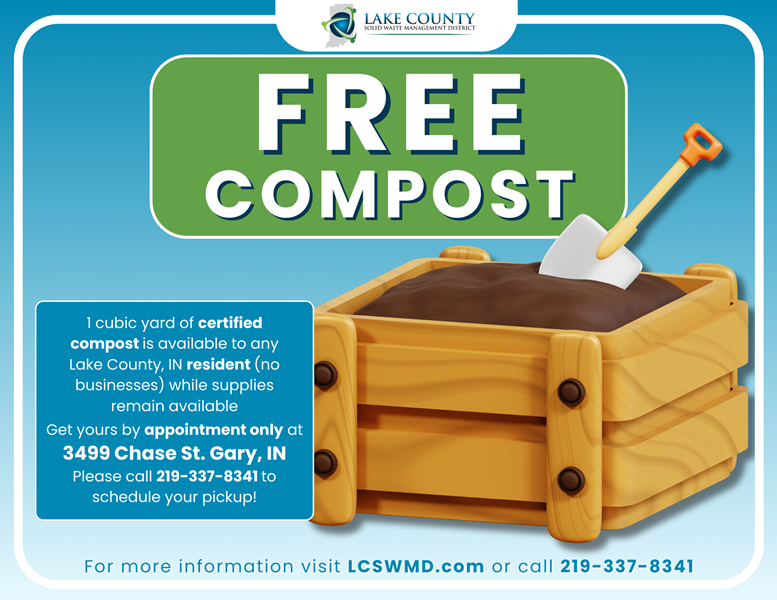Compost is available for purchase by businesses or local municipalities who are tax exempt. The LCSWMD offers up to 1 cubic yard of compost to Lake County, IN residents free of charge.
Please call Troy Taylor @ (219) 337-8341 or email ttaylor@lcswmd.com with any questions. Residents may call to schedule a pick-up for free compost.

Businesses wishing to purchase compost will need to complete the Compost Purchase Request Form
A valid tax exempt number is required.
Compost Purchase Request
Compost Analysis Report from A&L Great Lakes Laboratories
What is Composting?
Compost is organic matter that has been decomposed and recycled as a fertilizer and soil amendment which also serves as a natural pesticide. Compost is a key ingredient in organic farming. At the simplest level, the process of composting requires making a heap of wet organic matter known as green waste and waiting for the materials to break down into humus after a lengthy period of 1 to 2 years. Modern, methodical composting is a multi-step, closely monitored process with measured inputs of water, air, and carbon- and nitrogen-rich materials. The decomposition process is aided by shredding the plant matter, adding water and ensuring proper aeration by regularly turning the mixture. Worms and fungi further break up the material. Bacteria requiring oxygen to function and fungi manage the chemical process by converting the inputs into heat, carbon dioxide and ammonium. The ammonium is the form of nitrogen used by plants.
Facilities We Operate
At our Compost Facility, the Lake County Solid Waste Management District composts leaves through our Leaf Collection Program which services some of the unincorporated areas of Lake County. Currently, the District has 5 leaf vacuums that collect leaves and drop them off at our facility. Once the leaves are dropped off at the site, they are immediately placed in windrows where they will begin their decomposition. These leaves are closely monitored so that our staff can determine the appropriate internal temperature to begin turning them. Once the leaves reach an internal temperature of 130 -140 degrees, they enter a baking stage. Once this temperature is achieved, there is a 15 day window to turn the pile a minimum of 5 times. This ensures proper breakdown of the material as the temperature and moisture level are closely monitored. The windrows will eventually be grinded using a horizontal grinder where they will then be screened using a Trommel screen. The Trommel screen will then produce Grade A compost that the District sells to local municipalities and landscaping companies. Compost samples are sent to A&L Great Lakes Laboratory where it is tested to ensure it is top quality compost.
What Not To Compost and Why
- Black walnut tree leaves or twigs - Releases substances that might be harmful to plants
- Coal or charcoal ash - Might contain substances harmful to plants
- Dairy products (e.g, butter, milk, sour cream, yogurt) and eggs* - Create odor problems and attract pests such as rodents and flies
- Diseased or insect-ridden plants - Diseases or insects might survive and be transferred back to other plants
- Fats, grease, lard, or oils* - Create odor problems and attract pests such as rodents and flies